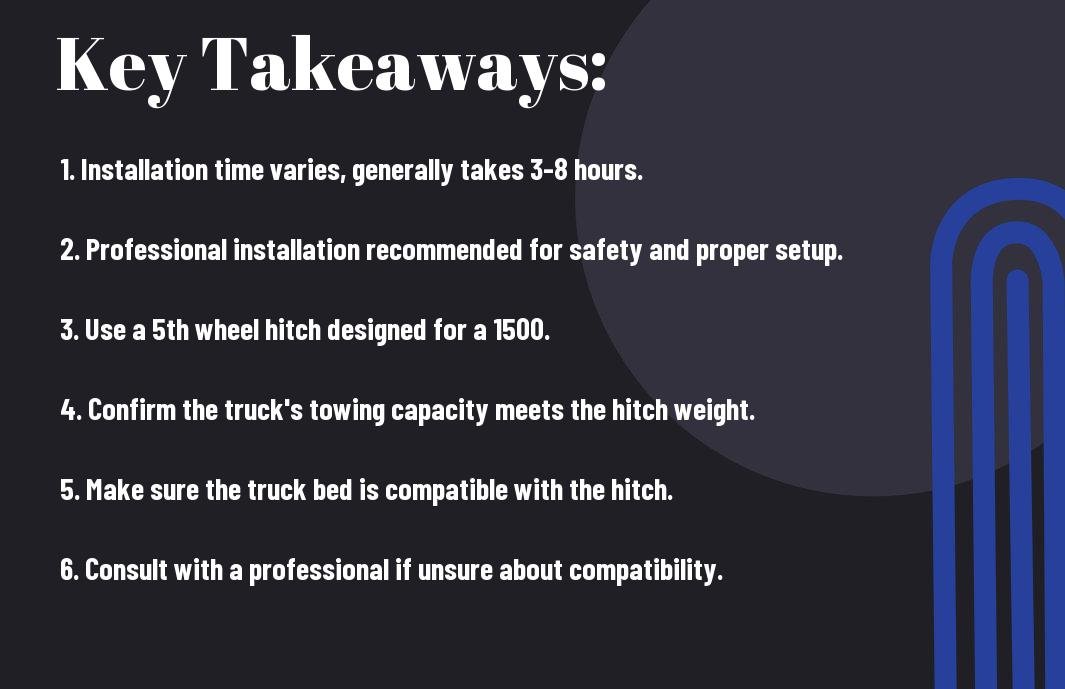Curious about how long it might take to install a 5th wheel hitch on your vehicle, or whether your 1500 can handle pulling a 5th wheel? Well, you’re in the right place. Installing a 5th wheel hitch can take on average between 1-2 hours, but it’s crucial to ensure it’s properly installed to avoid any dangerous mishaps on the road. As for whether your 1500 can pull a 5th wheel, it largely depends on the weight of the trailer and your vehicle’s towing capacity. It’s important to pay attention to your vehicle’s power, stability, and brakes when considering towing a 5th wheel, as overlooking these details can lead to serious safety concerns. Keep reading to find out if your 1500 is up to the task of pulling a 5th wheel and learn more about the installation process of a 5th wheel hitch.
Key Takeaways:
- Time to Install: The installation time for a 5th wheel hitch can vary, but on average, it may take 3-4 hours for a professional to install.
- DIY Installation: For those with experience and the right tools, a DIY installation may take longer, approximately 4-6 hours.
- Vehicle Compatibility: A 1500 truck can typically pull a 5th wheel, but it’s important to check the specific towing capacity of your vehicle before towing a 5th wheel.
- Towing Capacity: The towing capacity of a 1500 truck will depend on its specific model and equipment, so it’s crucial to verify that it can handle the weight of the 5th wheel.
- Consider Professional Installation: If you’re unsure about installing a 5th wheel hitch or if your vehicle can tow a 5th wheel, it’s best to consult with a professional for guidance.
- Proper Setup: It’s important to ensure that the 5th wheel hitch is properly installed and that all safety precautions are followed to avoid any towing issues.
- Consult Manufacturer Recommendations: Always refer to the manufacturer’s recommendations and guidelines for specific installation and towing information related to your 5th wheel hitch and vehicle.

Installation Time Factors
While the installation time of a 5th wheel hitch can vary depending on several factors, there are a few key elements that can impact the overall duration of the process. These factors include:
- The specific type of 5th wheel hitch being installed
- The level of experience and expertise you have with hitch installations
- The availability of necessary tools and equipment
- The accessibility of the installation site
- Any potential pre-installation requirements
Perceiving and understanding these factors can help you better manage your time and resources when preparing to install a 5th wheel hitch on your vehicle.
Types of 5th Wheel Hitches
When it comes to 5th wheel hitches, there are generally two main types: fixed and sliding hitches. The choice between the two largely depends on the size of your truck bed and the maneuverability you require while towing. While fixed hitches are more stable and less expensive, sliding hitches offer greater flexibility and convenience when navigating tight turns. Though the type of hitch you choose ultimately depends on your specific towing needs and preferences.
| Fixed Hitch | Sliding Hitch |
| Stable | Increased Maneuverability |
| Affordable | Convenient for Tight Turns |
Pre-Installation Requirements
Before you begin the installation process, it’s important to ensure that your vehicle meets the necessary requirements to support a 5th wheel hitch. This may include assessing your truck’s towing capacity, ensuring the bed of your truck is properly equipped for installation, and preparing any additional tools or materials required for the job. Checking off these requirements beforehand can help streamline the installation process and prevent any unforeseen setbacks along the way.
Step-by-Step Installation Guide
When it comes to installing a 5th wheel hitch, following a step-by-step guide can help ensure a smooth and successful installation. The process typically involves tasks such as assembling the hitch, mounting it to the bed of your truck, securing the necessary hardware, and testing the hitch for stability and security. Having a clear and detailed guide, along with the right tools and equipment, can help you navigate each step of the installation process with confidence and precision.
| Assembling the Hitch | Mounting to the Truck Bed |
| Securing Hardware | Testing Stability |
Towing with a 1500 Series Truck
Your 1500 series truck is a workhorse, capable of towing a variety of trailers, including 5th wheels. However, there are some important considerations to keep in mind when towing a 5th wheel with a 1500 series truck. In this chapter, we will explore the towing capabilities of a 1500 series truck and the adjustments and considerations you need to make when towing a 5th wheel.
1500 Series Truck Towing Capabilities
When it comes to towing with a 1500 series truck, it’s important to understand the truck’s towing capacity. Most 1500 series trucks have a towing capacity of around 9,000 to 10,000 pounds, making them well-suited for towing smaller to mid-sized 5th wheel trailers. However, it’s crucial to check your specific truck’s towing capacity before hitching up a 5th wheel. It’s also important to factor in the weight of any cargo or passengers in the truck, as this will impact the overall towing capacity. Always stay within the manufacturer’s recommended towing capacity to ensure safe and effective towing.
Adjustments and Considerations for 5th Wheels
When towing a 5th wheel with a 1500 series truck, there are a few adjustments and considerations to keep in mind. One of the most important considerations is the hitch setup. You will need to install a 5th wheel hitch in the bed of your truck, which will require proper installation to ensure a secure connection between the truck and the trailer. Additionally, you may need to make adjustments to the truck’s suspension or tires to handle the added weight of the 5th wheel. It’s also important to consider the overall length and height of the truck and trailer combination, as well as any specific towing regulations in your area. By making these adjustments and considerations, you can ensure a safe and smooth towing experience with your 1500 series truck and 5th wheel trailer.
Safety and Maintenance
Keep in mind that safety should be your top priority when it comes to towing a 5th wheel. Regular maintenance of your hitch and trailer is also essential for safe and trouble-free towing.
Regular Maintenance Checks
It’s important to perform regular maintenance checks on your 5th wheel hitch and trailer to ensure everything is in good working condition. This includes inspecting the hitch for any signs of wear or damage, checking the hitch’s bolts and fasteners for tightness, and greasing the moving parts as recommended by the manufacturer. Additionally, you should inspect the trailer’s brakes, tires, and lights before every trip to ensure they are functioning properly.
Safety Tips for Towing 5th Wheels
When it comes to towing a 5th wheel trailer, proper weight distribution is crucial for safe towing. Make sure the trailer is loaded properly, with about 15-25% of the trailer’s weight on the hitch. This will help prevent swaying and instability while towing. Additionally, it’s important to invest in quality towing equipment that is rated for the weight of your trailer and your towing vehicle. Always double-check your hitch and trailer connections before hitting the road, and be sure to use safety chains properly to secure the trailer to your vehicle. Recognizing the limitations of your vehicle and trailer, as well as practicing safe driving habits, will help ensure a safe and enjoyable towing experience.
Conclusion
Conclusively, the time it takes to install a 5th wheel hitch can vary depending on the specific model and your level of experience. However, on average, it can take anywhere from 3-6 hours to install a 5th wheel hitch. As for whether a 1500 can pull a 5th wheel, it ultimately depends on the specific weight and towing capacity of your truck. Many newer model 1500 trucks are equipped to handle 5th wheel towing, but it’s important to consult your vehicle’s manual and consider factors such as payload capacity and trailer weight before attempting to tow a 5th wheel. It’s essential to ensure that your truck is properly equipped and rated for 5th wheel towing to ensure safety and prevent damage to your vehicle.
5th Wheel Hitch Installation and Towing Capacity FAQ
Q: How long does it take to install a 5th wheel hitch?
A: The installation time for a 5th wheel hitch can vary depending on the make and model of your vehicle, as well as the specific hitch being installed. On average, it can take anywhere from 1-3 hours for a professional installer to complete the job.
Q: Can a 1500 pull a 5th wheel?
A: Generally, a 1500 (or half-ton) truck is not recommended for towing a 5th wheel trailer. However, some newer half-ton trucks with specialized towing packages and higher towing capacities may be capable of safely towing a smaller 5th wheel trailer. It is crucial to consult your vehicle’s manual and the trailer’s specifications to ensure it is within the towing capacity of your truck.
Q: What kind of vehicle is suitable for towing a 5th wheel?
A: A heavy-duty truck, such as a 3/4-ton or 1-ton truck, is typically recommended for towing a 5th wheel due to their higher towing capacities and stability. It is important to ensure that your truck’s towing capacity exceeds the weight of the loaded 5th wheel trailer.
Q: Are there different types of 5th wheel hitches?
A: Yes, there are several types of 5th wheel hitches, including traditional fixed hitches, sliding hitches for short bed trucks, and gooseneck adapters. Each type of hitch has its own set of features and benefits, so it’s essential to choose the right one for your specific towing needs.
Q: Do I need any special equipment to install a 5th wheel hitch?
A: Yes, installing a 5th wheel hitch generally requires special tools and equipment, such as a torque wrench, drill, and mounting brackets. It is highly recommended to have the hitch installed by a professional to ensure proper installation and safety.
